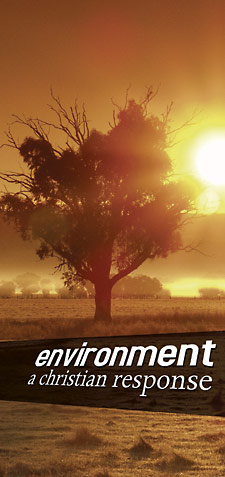Finally, an explanation of the Christian approach to the environment that can be absorbed on an afternoon in the train or passed on to an acquaintence without fear of stressing the friendship.
Environment - A Christian Response is a pamphlet published by the Sydney Diocese’ Social Issues Executive (SIE) that crams in a lot of Biblical thinking in a tiny 24 pages.

There have been a number of excellent Christian publications on this topic - reference Kirsten Birkett’s Unnatural Enemies - but the SIE clearly has on-the-go Sydneysiders in their sights.
Environment - A Christian Response is designed to fit neatly into a coat pocket with a image-conscious graphic design that’s easy on the eye.
The booklet contains a strong scriptural argument followed by practical applications for Australian society where politics, localised and global problems are concerned.
This is the first in a planned series of six which will tackle current hot potatoes like ‘Asylum Seekers’ and ‘Abortion’.
The ‘Asylum Seekers’ pamphlet is due out later this year.
Until Christian publishers cotton on to the growing audio book market, the SIE pamphlets are likely to provide good filling for time-poor Christians who are still keen to understand the implications of their faith.
An extract of the first pamphlet is available below…
Environment - A Christian Response
We're thinking about our natural environment as never before. Even the most environmentally insensitive of us have fleeting thoughts about it; and for some younger people, environmental degradation is as serious a worry as was the threat of nuclear war was to their parents. It's complex, there are many unanswered questions, and most of us don't even know where to begin.
Anyone who has looked into environmentalism knows that some think Christianity is the main villain behind modern destruction of the natural world.
This view was put very forcefully in a famous 1967 article by Lynn White. White said that before Christianity, "man had been part of nature", but under Christianity's influence (particularly in Northern Europe), humanity became the ruthless "exploiter of nature". Christianity's insistence that nature is not sacred and that only human beings are in the image of God meant, according to White, that "Christianity made it possible to exploit nature in a mood of indifference to the feelings of natural objects."
This article, and its very bitter tone, has shaped the attitudes of many environmentally sensitive people toward Christianity. Of course, it is easy to point to Christian people who abuse the environment. But it may be easier than White admits to find people from other backgrounds who are equally abusive to it. More to the point, White does not really pay enough attention to the surprising environmental awareness evident within the pages of the Christian Bible.
This booklet is an attempt to show what Christianity has to say about environmental issues.
"¢ We'll start by sketching the different approaches to environmental thinking.
"¢ We'll outline what the Bible says about the natural world.
"¢ We will endorse the kind of environmental thinking we think makes the most sense.
While we don't pretend to have all the answers, we hope this booklet will be a kick-start to act.























